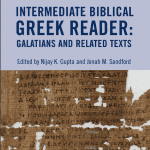Translating Philippians
This is a blog series reflecting on Bible translation by looking at the Greek text of Philippians. In my book Reading Philippians, I offer my own fresh translation of this letter. I tried to provide a readable, modern English translation, which means I made some untraditional choices. Follow along as I talk through some of these decisions. Here we will look at Phil 2:12-30.

“you need to live out your own divine deliverance” (2:12)
τὴν ἑαυτῶν σωτηρίαν κατεργάζεσθε·
Traditionally, this has been translated, “work out your own salvation.” But I went in a different direction, because (1) Paul is not talking about earning salvation by human works (obviously) and (2) Paul is not necessarily talking about future (i.e., afterlife) salvation. Phil 2:12 echoes what he already said about his own divine deliverance in 1:19. It is not that they need to be working or doing good works, but rather it is about being active in following God’s lead in how he is guiding them through their difficulties. I found that “live out” captures the meaning of κατεργάζεσθε better than “work out” because just the language of “work(s)” gets people worked up and confused.
“…so I have reason to celebrate and happily toast your celebration; and vice versa, be sure that you celebrate and toast me” (2:18)
χαίρω καὶ συγχαίρω πᾶσιν ὑμῖν τὸ δὲ αὐτὸ καὶ ὑμεῖς χαίρετε καὶ συγχαίρετέ μοι.
Whenever I can, I try to avoid “Christian-ese” language in translation (“rejoice”!) because we overuse it and it loses its meaning. Here, I didn’t want to use “rejoice.” We just don’t use this word in everyday speech the way Paul and others in his time used χαίρω. I wanted to find the most natural way today to express what he was expressing; so I went for “celebrate/celebration” and “toasting.”
This is a remarkable set of verses. Paul is facing death, and perhaps the Philippians too. And rather than cool down their concerns, he confronts this prospect head-on. I might die? OK, let’s go out with style! Cheers to you, it will be the most glorious death ever! Phil 2:17-18 is kind of morbid in that way, but Paul is instilling in the Philippians a whole new way to look at their life—and their death—as being to the glory of God alone. Cheers!
Epaphroditus…apostolic delegate (2:25)
Ἐπαφρόδιτον τὸν ἀδελφὸν καὶ συνεργὸν καὶ συστρατιώτην μου, ὑμῶν δὲ ἀπόστολον καὶ λειτουργὸν τῆς χρείας μου
I had a bit of trouble figuring out the best way to translate ἀποστολος here. Yes, this is the word that also means “Apostle” (as Paul is an ἀποστολος). But most scholars and translators recognize that here Paul was not treating Epaphroditus as an official “Apostle.” So, most translations opt for “messenger,” one who is sent out with a particular mission. But there are other ways to say “messenger” that are clearer and more common (why didn’t Paul use ἄγγελος?). I think Paul chose ἀποστολος, even if in a non-technical way, as an honorific title that also conveyed his role as a representative of the church. So I chose “apostolic delegate,” presuming that any church could dispatch such a messenger, but they had the “honor” of representing their community and its leadership. They were an apostle-like delegate of the church.

















